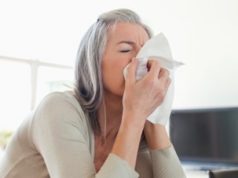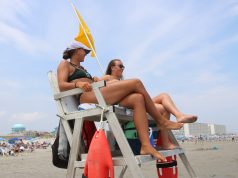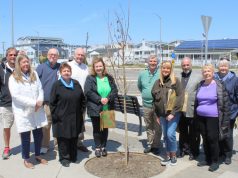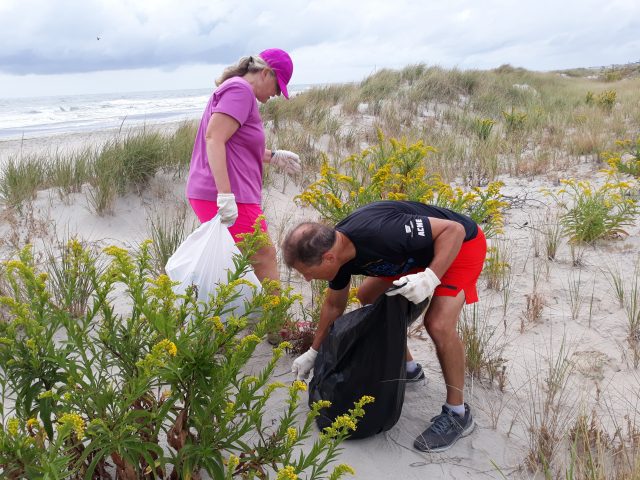
By DONALD WITTKOWSKI
It seems that more and more smokers are keeping their butts off Sea Isle City’s beaches.
A smaller number of discarded cigarette butts were picked up during the city’s annual fall community beach cleanup than in previous years in what is seen as a promising trend, according to a new report released Friday.
The report by the city’s Environmental Commission suggests that a beach smoking ban that began in 2019 may be helping to keep Sea Isle’s shoreline cleaner, although cigarette filters are still being found by the hundreds.
“Data collection from the October 9, 2021 beach cleanup event shows a decrease on the number of collected cigarette filters compared to previous years beach cleanups. However, cigarette filters or butts are the most common form of litter found in our Sea Isle beaches,” the report says.
The report adds that further study is needed before it can be proved that the smoking ban is the direct reason why a smaller number of cigarette butts are being found.
“(This) could be an indication that the smoking ban is correlated to the decrease of the number of plastic cigarette filters collected. There is need to gather further beach cleanup collection data in order to assess properly the decrease of plastic cigarette filters over time,” it states.
A statewide smoking ban at New Jersey’s beaches and public parks took effect Jan. 1, 2019. The state gave shore communities the discretion to either ban smoking altogether or designate small areas where beachgoers could still light up. Sea Isle imposed a complete smoking ban on its beaches.
The report notes that cigarette butts are a type of non-biodegradable plastic containing heavy metals, such as arsenic, and toxic organic compounds, such as nicotine and hydrocarbons.
“These chemicals can also leach out of the cigarette butt and pose acute toxic effects to aquatic organisms,” it states.
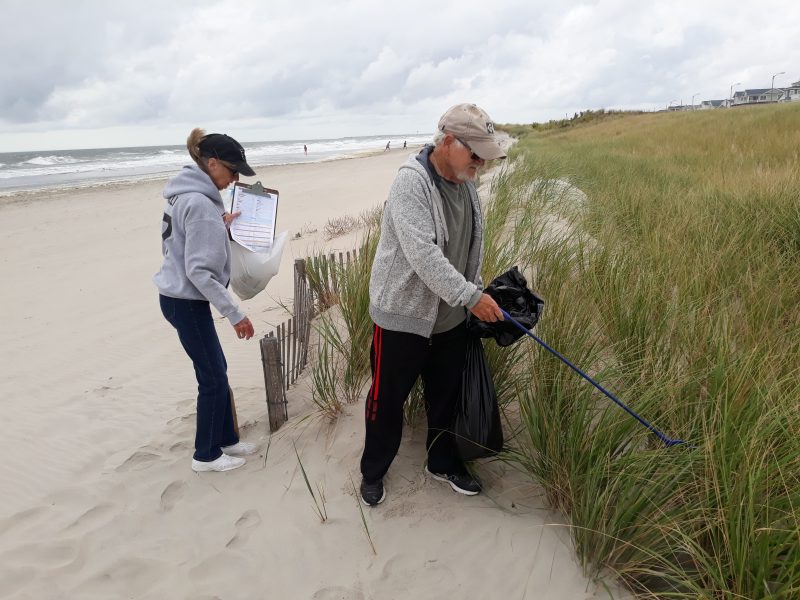
Altogether, 550 discarded cigarette butts were removed from Sea Isle’s beaches during the October cleanup. In the fall beach cleanup in 2018, there were 1,124 cigarette butts and in 2019 there were 1,154, the report said. The cleanup was canceled in 2020 due to the pandemic.
Each year, Sea Isle is one of the shore communities that participate in beach sweeps in the spring and fall organized by Clean Ocean Action, a state environmental organization.
Sea Isle’s cleanup volunteers catalog the types of trash and debris that are found. The information is sent to Clean Ocean Action as part of a statewide database from beach sweeps at shore towns across New Jersey.
Overall, 3,563 pieces of trash and debris were collected from Sea Isle’s beaches and dunes in October. That number is down significantly from the 6,580 pieces of trash and debris removed during the beach cleanup in October 2018 and 8,615 in October 2019.
“This shows an encouraging trend and invites everyone to continue this momentum and take ownership in the effort to keeping our beaches clean,” the report says.
However, the report also notes that the Environmental Commission remains concerned about the amount of plastic litter that continues to pollute the beaches and dunes – even though it is down overall in Sea Isle compared to previous years.
By far, most of the trash removed from the shoreline is of the plastic type, which includes cigarette filters. Bottle caps, food and candy wrappers, straws and bags are also commonly found among the plastic litter.
“They pose an environmental damage to the beach and (specifically) to marine life,” the report says of plastic trash.

Hoping to protect the environment and reduce pollution, New Jersey is moving ahead with a ban on plastic grocery store bags, Styrofoam food containers and plastic straws beginning May 4, 2022.
The Environmental Commission’s report says that Sea Isle’s businesses could consider eco-friendly alternatives to replace the use of plastic store bags, Styrofoam food containers and straws.
Currently, some vendors in Sea Isle have already adopted the use of paper straws. Some businesses are going a step further by not providing a straw with beverages unless it is requested by the customer, the report says.
The author of the report is Environmental Commission member Maria Andrews, who is the associate director of undergraduate programs for the Department of Earth and Environmental Science at the University of Pennsylvania.
The report also includes written comments from some of the volunteers who participated in the cleanup. Some of the comments concurred with the report’s findings that smaller amounts of trash are being found on the beaches.
“Less than most fall cleanups,” one volunteer wrote.
“Was not as bad as prior years,” another volunteer commented.
“Not too bad in area I was in. Seen it worse,” was another comment.
Some of the most unusual types of trash or debris found during the cleanup included a $5 bill, a steel door, pieces of lumber, a kite, a bicycle basket, glow sticks, a large meat bone, a live mouse discovered in recyclables and two dead baby moles.


